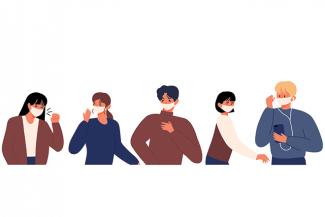
It is crucial to root out stigma and discriminatory behaviour linked to coronavirus disease and death and restore emotional connection and compassion to build a stronger community to fight the crisis together, writes psychotherapist H'vovi Bhagwagar.
What happens to us when we watch a movie of the “Pre-COVID times” where people are jostling in a metro, or crowding supermarkets or hugging to greet each other? Doesn’t our brain automatically say, “Hey that’s wrong!” What earlier seemed so natural is now becoming unacceptable to our brains. According to a BBC report “the shudder of worry and the visceral reaction to crowded scenes set in bars, nightclubs and shopping centres are a recognition that our brains are being rewired to accept more distant social practices.”
We are slowly foreseeing the “new normal” that the COVID Pandemic is bringing into our lives. We are acknowledging that on top of the list, it is personal contact that will drastically change in the COVID era. However, while restricting personal contact is a safety measure, our brains extrapolates this to all contact, and further generalizes it to mean that we need to “stay away from”, ignore and avoid those detected or suspected with having the virus. Not surprisingly, one of the disheartening fallouts of the pandemic has been the way it is shaping our psyche into becoming paranoid and phobic.
The SARS pandemic of 2003 taught us many lessons in how social distancing can become psychologically damaging. A study in the Lancet titled "The psychological impact of quarantine" reviewed several studies after the SARS outbreak and found that high anxiety and fear resulted in people exhibiting avoidance behaviours of crowded enclosed places, and vigilant handwashing even after the quarantine ended. For some, the return to normality was delayed by many months. Will the Corona Virus Pandemic, several times more damaging than SARS, leave an indelible scar on humanity? It is indeed the biggest test we may face in this lifetime, because the choices we make today determines the people we become tomorrow.
When fear extrapolates to stigma
These are abnormal times and therefore our most normal reaction to the current situation would be fear. We are faced with an invisible and constantly mutating virus, along with continuous reminders to take care of our health and safety; and the constant worry about the approaching economic consequences. All these are combined to create valid sources of fear, which then lead us to avoid the things which could make us vulnerable. Researchers term this response “parasite avoidance”, a group of evolutionary responses that prevent us from maintaining contact with others who may carry communicable diseases. One of the central features of this response is disgust (Sarabian, Curtis & McMullan, 2018), a protective behavioural pattern that keeps us away from sources of the pathogens.
However, fear and disgust that is healthy and protective could take an ugly turn when we start believing that we need to make ourselves “invincible”. Safety precautions soon acquire a moralistic flavour, and healthy social distancing converts to stigma and prejudice. Unspoken thoughts cross our mind, “Maybe they didn’t distance enough or wash their hands enough or sanitise all food packets. Maybe it’s their bad karma. Maybe they deserve it because it originated from their country”. These thoughts comfort us and make us falsely believe that “If we are good, and do good we won’t get infected”. We soon reach a place of moral superiority and frown on those who are infected. However, this is a fallacy. We could wash every packet that reaches our home with soapy water, drink all the kaadha we can make, stay indoors, wash our hands for 60 seconds instead of 20 seconds, and still get the virus. That is because we are living in unpredictability, and our actions do not guarantee invincibility.
The fallouts of unprecedented fear
Today is an eerie reminder of the 80s and 90s, the days when we discriminated against those with HIV and AIDS. Lack of information back then caused us to shun this group, and it took at least a decade of awareness campaigns for us to treat HIV positive people with sensitivity. Today we are applying a similar logic of discrimination towards COVID positive/suspect cases. As we struggle to cope with information about corona related disease and death, our anxiety ridden minds are searching for easy targets to lay the blame on. The stigmatization and social isolation of people detected with COVID, as well as their families is another step down for humanity. This stigma can take the form of social rejection, gossip, physical violence, and denial of services. Healthcare workers have been asked to vacate their homes, those who have travelled abroad have been trolled against, communal and class-based hatred has reached new heights. Possibly the most dehumanizing is the xenophobia, where there is discrimination against people of certain ethnicity or nationality.
What is the toll of such stigmatization? A recent article in the Harvard Business Review reported that experiencing stigma from others can lead to elevated depressive symptoms, stress, and substance use. What is worse, people don’t have to experience stigma from others to be negatively affected by it. Just anticipating stigma can lead to anxiety and stress. According to the WHO “using criminalizing or dehumanizing terminology creates the impression that those with the disease have somehow done something wrong or are less human than the rest of us”. Apart from the mental health fallouts, stigmatizing anyone during a pandemic poses a threat to everyone. People may try to hide their illness to avoid discrimination and are therefore less likely to get tested or treated if they experience symptoms. In the socially-conscious Indian society, stigma is possibly even more likely and is already proving to be the biggest deterrent towards flattening the curve and breaking the chain. Dr Randeep Guleria, director of the All India Institute of Medical Sciences (AIIMS) said in a news report “While 90-95% of Covid-19 patients recover, the mortality rate from the disease is rising due to the stigma attached to the disease. Infected patients are approaching healthcare facilities at a later stage which is leading to increased mortality”.
Stigmatising those with COVID has another shocking fallout. Anecdotal evidence suggests that there is an almost 50% escalation in death by suicide as compared to 2019. Our best guess is that the COVID stigma, job loss, and other social issues could be the cause. No section of society seems immune to taking their lives during the pandemic.Journalists, healthcare workers, andthose in the informal sector,have been in the news for COVID related death by suicide. Many of these unfortunate cases have been at the receiving end of social ostracization.
More than at any other time, we need to start preparing to reduce the crisis on humanity arising from the Pandemic.
The power of attunement
All of us as a community can work together to reduce the toll of stigma. Our shared vulnerability can bring us emotionally closer instead of separating us. We live in the internet age and can be hugely grateful for the unique way it is bringing us together. The internet is in many ways our stress mitigator; it’s what is holding us upright during this isolation. When the Spanish flu of 1918 crippled the world, and infected a third of the world’s population, people had no access to the communication mediums we have today. Critical information regarding the virus was shared via postmen, Boy Scouts, and teachers, while today we have world health bodies giving us updated knowledge at our fingertips. Knowledge that has possibly kept us safe so far. Web Conferencing can help us start conversations and disseminate education. Trending hashtags can buoy our spirits, as well as keep us updated with world events. Facebook, Instagram and Twitter can be our best engagement strategy in communicating with those far away. Activating our social network, albeit remotely, is not only a key priority at this time but an inability to engage in this manner may be associated not just with immediate anxiety, but long-term distress.
As a reality check though, while the internet has been massively empowering during these times, let’s also recognise that virtual connection doesn’t automatically replace human connection. Our minds are attuned to visual contact and to physical proximity. So, when our only option is to connect virtually, our engagement needs to be more intimate, rather than superficial. For example, it is important to engage in deep intentional and vulnerable conversations with those we trust, rather than just social conversations. Sharing our deepest worries allows a sense of the emotional attunement to build with the others person, in the absence of personal interaction. Attunement can be achieved in many creative ways, during this time of isolation. Bond with family members, make sure you offer warmth through a hug or a cuddle with your loved ones. Check-in with others, ask them how they are doing. The next time you visit a store for purchases, don’t avoid eye contact and jump a mile away from other people. Even while we are all wearing masks, allow attunement with simple eye contact, conveying solidarity during these moments of despair. Pets can be a huge source of connection; offer them a lot of physical affection, it can be a very visceral experience (CDC recommends restricting contact with pets if you contract COVID-19 until the risks of transmission between humans and animals are better understood). Creating these experiences takes effort. We are used to hugging, shaking hands, back-slapping and high-fives. But we can bond even though we are physically distant.
Emotional connection becomes crucial if you have a pre-existing health condition. For the millions who are grappling with mental and physical illnesses, continuing to seek support from healthcare professionals can establish a much-needed source of comfort and security. Several of my clients have tided through crisis situations during this lockdown with the help of online therapy sessions. Also, there is evidence to suggest that support groups specifically for people who were quarantined at home during disease outbreaks can be helpful. To get help on concerns related to mental health you may call NIMHANS at 08046110007.
Engaging with the community is another important way to stay emotionally connected to one another. We’ve heard stories of millions around the world responding with acts of generosity- angels working round the clock to send food to the needy, closed businesses that continue to pay their employees, people donating to food banks, paramedical staff forming relay chains to supply food to healthcare workers, people helping their apartment complexes to procure supplies, and providing meals to their security guards. Practicing kindness toward others and toward ourselves, is a great way to feel closer, rather than feel farther apart.
Isolation, blame, scapegoating and bitterness will not make this any less of a crisis, and should not be our legacy. Connection and compassion will help us endure. The Dalai Lama’s words could not have found a more befitting time “Love and compassion are necessities, not luxuries. Without them humanity cannot survive”.

H'vovi Bhagwagar is a Psychotherapist with her office “MANASHNI” at Powai, Mumbai and works with people diagnosed with mental health issues. H'vovi lives by the belief that being an effective therapist flows from being a good human being. She writes to spreads awareness about mental health through her blog and articles.





